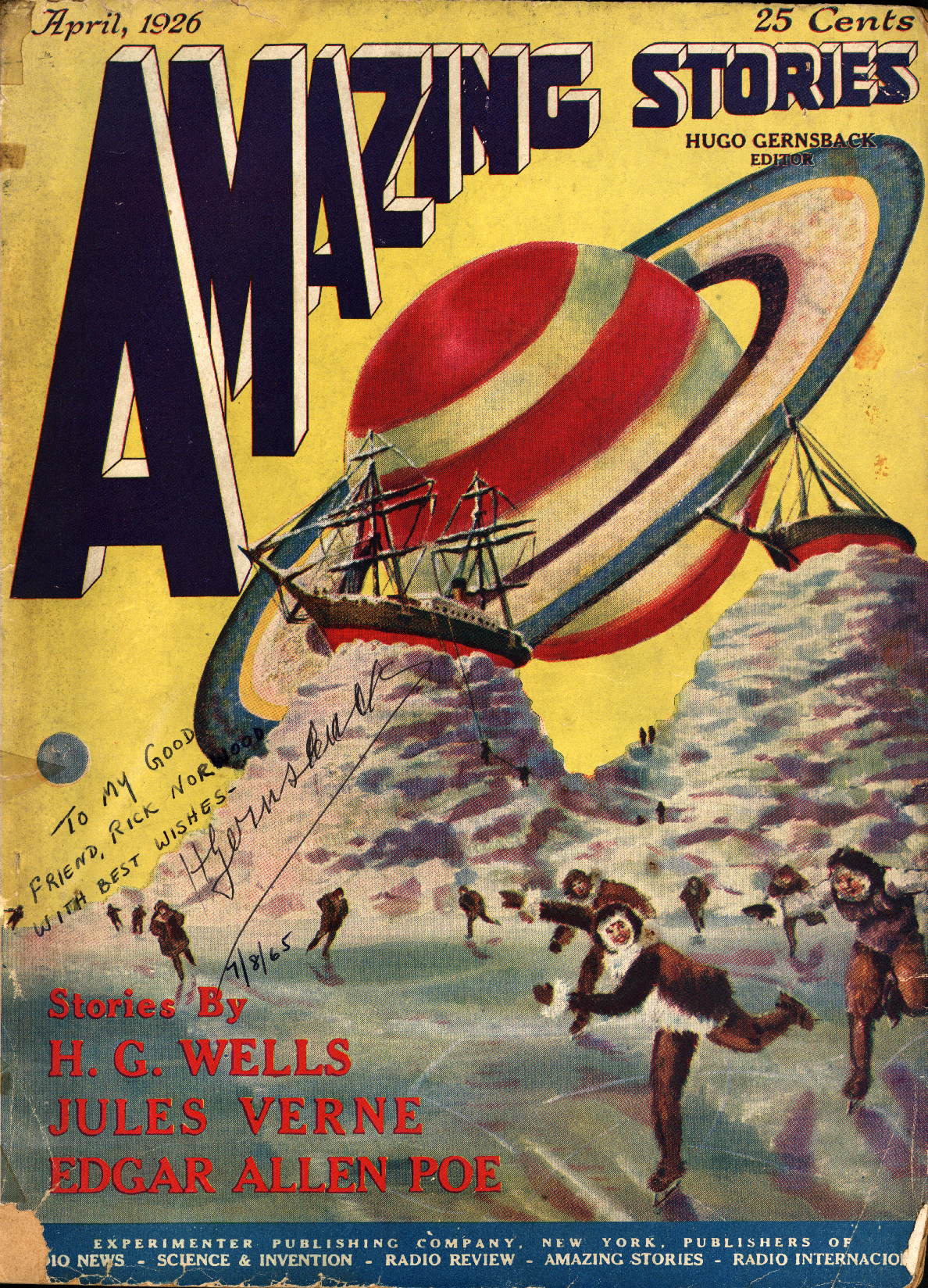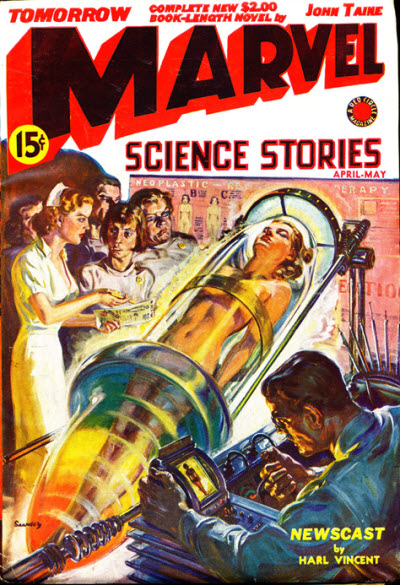|
Betsy Curtis
Elizabeth M. Curtis (September 17, 1917 – April 17, 2002) was an American science fiction/fantasy writer. She was born in Toledo, Ohio. She earned a BA and MA in English from Oberlin College. In 1966, she earned a MEd from Allegheny College. Her first short story was published in ''The Magazine of Fantasy & Science Fiction'' in 1950. Her second story was published later that same year in ''Imagination''. Her work appeared in various publications, including ''Amazing Stories'', ''Analog Science Fiction and Fact'', ''Authentic Science Fiction'', ''Galaxy Science Fiction'', '' If'', ''Infinity Science Fiction'' and ''Marvel Science Stories'',. In all, she is known to have published sixteen stories from 1950 through 1973. In 1969, she was nominated for a Hugo Award for Best Short Story for "The Steiger Effect". She never published a novel. She was an active member of the Society for Creative Anachronism. Curtis died at the age of 84. Family Curtis's daughter was editor Mag ... [...More Info...] [...Related Items...] OR: [Wikipedia] [Google] [Baidu] |
Toledo, Ohio
Toledo ( ) is a city in and the county seat of Lucas County, Ohio, United States. A major Midwestern United States port city, Toledo is the fourth-most populous city in the state of Ohio, after Columbus, Cleveland, and Cincinnati, and according to the 2020 census, the 79th-largest city in the United States. With a population of 270,871, it is the principal city of the Toledo metropolitan area. It also serves as a major trade center for the Midwest; its port is the fifth-busiest in the Great Lakes and 54th-biggest in the United States. The city was founded in 1833 on the west bank of the Maumee River, and originally incorporated as part of Monroe County, Michigan Territory. It was refounded in 1837, after the conclusion of the Toledo War, when it was incorporated in Ohio. After the 1845 completion of the Miami and Erie Canal, Toledo grew quickly; it also benefited from its position on the railway line between New York City and Chicago. The first of many glass manufacturers ... [...More Info...] [...Related Items...] OR: [Wikipedia] [Google] [Baidu] |
Amazing Stories
''Amazing Stories'' is an American science fiction magazine launched in April 1926 by Hugo Gernsback's Experimenter Publishing. It was the first magazine devoted solely to science fiction. Science fiction stories had made regular appearances in other magazines, including some published by Gernsback, but ''Amazing'' helped define and launch a new genre of pulp fiction. As of 2018, ''Amazing'' has been published, with some interruptions, for 92 years, going through a half-dozen owners and many editors as it struggled to be profitable. Gernsback was forced into bankruptcy and lost control of the magazine in 1929. In 1938 it was purchased by Ziff-Davis, who hired Raymond A. Palmer as editor. Palmer made the magazine successful though it was not regarded as a quality magazine within the science fiction community. In the late 1940s ''Amazing'' presented as fact stories about the Shaver Mystery, a lurid mythos that explained accidents and disaster as the work of robots named deros, w ... [...More Info...] [...Related Items...] OR: [Wikipedia] [Google] [Baidu] |
American Science Fiction Writers
American(s) may refer to: * American, something of, from, or related to the United States of America, commonly known as the "United States" or "America" ** Americans, citizens and nationals of the United States of America ** American ancestry, people who self-identify their ancestry as "American" ** American English, the set of varieties of the English language native to the United States ** Native Americans in the United States, indigenous peoples of the United States * American, something of, from, or related to the Americas, also known as "America" ** Indigenous peoples of the Americas * American (word), for analysis and history of the meanings in various contexts Organizations * American Airlines, U.S.-based airline headquartered in Fort Worth, Texas * American Athletic Conference, an American college athletic conference * American Recordings (record label), a record label previously known as Def American * American University, in Washington, D.C. Sports teams Soccer * B ... [...More Info...] [...Related Items...] OR: [Wikipedia] [Google] [Baidu] |
1917 Births
Events Below, the events of World War I have the "WWI" prefix. January * January 9 – WWI – Battle of Rafa: The last substantial Ottoman Army garrison on the Sinai Peninsula is captured by the Egyptian Expeditionary Force's Desert Column. * January 10 – Imperial Trans-Antarctic Expedition: Seven survivors of the Ross Sea party were rescued after being stranded for several months. * January 11 – Unknown saboteurs set off the Kingsland Explosion at Kingsland (modern-day Lyndhurst, New Jersey), one of the events leading to United States involvement in WWI. * January 16 – The Danish West Indies is sold to the United States for $25 million. * January 22 – WWI: United States President Woodrow Wilson calls for "peace without victory" in Germany. * January 25 ** WWI: British armed merchantman is sunk by mines off Lough Swilly (Ireland), with the loss of 354 of the 475 aboard. ** An anti- prostitution drive in San Francisco occurs, and ... [...More Info...] [...Related Items...] OR: [Wikipedia] [Google] [Baidu] |
Society For Creative Anachronism
The Society for Creative Anachronism (SCA) is an international living history group with the aim of studying and recreating mainly Medieval European cultures and their histories before the 17th century. A quip often used within the SCA describes it as a group devoted to the Middle Ages "as they ought to have been", choosing to "selectively recreate the culture, choosing elements of the culture that interest and attract us". Founded in 1966, the non-profit educational corporation has over 20,000 paid members as of 2020 with about 60,000 total participants in the society (including members and non-member participants). History The SCA's roots can be traced to a backyard party of a UC Berkeley medieval studies graduate, the author Diana Paxson, in Berkeley, California, on May Day in 1966. The party began with a "Grand Tournament" in which the participants wore helmets, fencing masks, and usually some semblance of a costume, and sparred with each other using weapons such as plywood ... [...More Info...] [...Related Items...] OR: [Wikipedia] [Google] [Baidu] |
Hugo Award For Best Short Story
The Hugo Award for Best Short Story is one of the Hugo Awards given each year for science fiction or fantasy stories published or translated into English during the previous calendar year. The short story award is available for works of fiction of fewer than 7,500 words; awards are also given out for pieces of longer lengths in the novelette, novella, and novel categories. The Hugo Awards have been described as "a fine showcase for speculative fiction" and "the best known literary award for science fiction writing". The Hugo Award for Best Short Story has been awarded annually since 1955, except in 1957. The award was titled "Best Short Fiction" rather than "Best Short Story" in 1960–1966. During this time no Novelette category was awarded and the Novella category had not yet been established; the award was defined only as a work "of less than novel length" that was not published as a stand-alone book. In addition to the regular Hugo awards, beginning in 1996 Retrospective H ... [...More Info...] [...Related Items...] OR: [Wikipedia] [Google] [Baidu] |
Marvel Science Stories
''Marvel Science Stories'' was an American pulp magazine that ran for a total of fifteen issues in two separate runs, both edited by Robert O. Erisman. The publisher for the first run was Postal Publications, and the second run was published by Western Publishing; both companies were owned by Abraham and Martin Goodman. The first issue was dated August 1938, and carried stories with more sexual content than was usual for the genre, including several stories by Henry Kuttner, under his own name and also under pseudonyms. Reaction was generally negative, with one reader referring to Kuttner's story "The Time Trap" as "trash". This was the first of several titles featuring the word "Marvel", and ''Marvel Comics'' came from the same stable in the following year. The magazine was canceled after the April 1941 issue, but when a boom in science fiction magazines began in 1950, the publishers revived it. The first issue of the new series was dated November 1950; a further six issues ap ... [...More Info...] [...Related Items...] OR: [Wikipedia] [Google] [Baidu] |
If (magazine)
''If'' was an American science fiction magazine launched in March 1952 by Quinn Publications, owned by James L. Quinn. The magazine was moderately successful, though for most of its run it was not considered to be in the first tier of American science fiction magazines. It achieved its greatest success under editor Frederik Pohl, winning the Hugo Award for best professional magazine three years running from 1966 to 1968. ''If'' published many award-winning stories over its 22 years, including Robert A. Heinlein's novel ''The Moon Is a Harsh Mistress'' and Harlan Ellison's short story "I Have No Mouth and I Must Scream". The most prominent writer to make his first sale to ''If'' was Larry Niven, whose story "The Coldest Place" appeared in the December 1964 issue. ''If'' was merged into ''Galaxy Science Fiction'' after the December 1974 issue, its 175th issue overall. Publication history Although science fiction had been published in the United States before the 1920s, it di ... [...More Info...] [...Related Items...] OR: [Wikipedia] [Google] [Baidu] |
Galaxy Science Fiction
''Galaxy Science Fiction'' was an American digest-size science fiction magazine, published in Boston from 1950 to 1980. It was founded by a French-Italian company, World Editions, which was looking to break into the American market. World Editions hired as editor H. L. Gold, who rapidly made ''Galaxy'' the leading science fiction magazine of its time, focusing on stories about social issues rather than technology. Gold published many notable stories during his tenure, including Ray Bradbury's "The Fireman", later expanded as ''Fahrenheit 451''; Robert A. Heinlein's ''The Puppet Masters''; and Alfred Bester's ''The Demolished Man''. In 1952, the magazine was acquired by Robert Guinn, its printer. By the late 1950s, Frederik Pohl was helping Gold with most aspects of the magazine's production. When Gold's health worsened, Pohl took over as editor, starting officially at the end of 1961, though he had been doing the majority of the production work for some time. Under Pohl ''Gala ... [...More Info...] [...Related Items...] OR: [Wikipedia] [Google] [Baidu] |
Authentic Science Fiction
''Authentic Science Fiction'' was a British science fiction magazine published in the 1950s that ran for 85 issues under three editors: Gordon Landsborough, H.J. Campbell, and E.C. Tubb. The magazine was published by Hamilton and Co. in London and began in 1951 as a series of novels appearing every two weeks; by the summer it became a monthly magazine, with readers' letters and an editorial page, though fiction content was still restricted to a single novel. In 1952 short fiction began to appear alongside the novels, and within two more years it completed the transformation into a science fiction magazine. ''Authentic'' published little in the way of important or ground-breaking fiction, though it did print Charles L. Harness's "The Rose", which later became well-regarded. The poor rates of pay—£1 per 1,000 words—prevented the magazine from attracting the best writers. During much of its life it competed against three other moderately successful British science fiction m ... [...More Info...] [...Related Items...] OR: [Wikipedia] [Google] [Baidu] |





